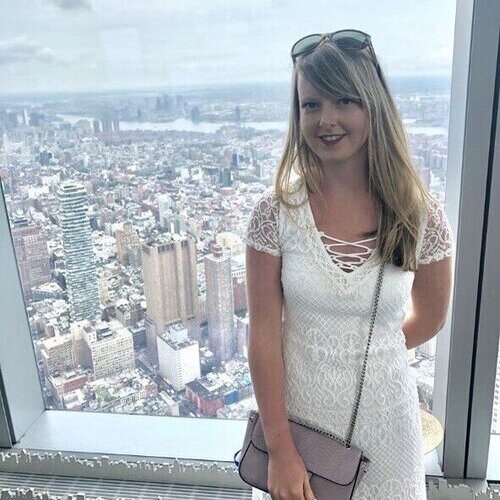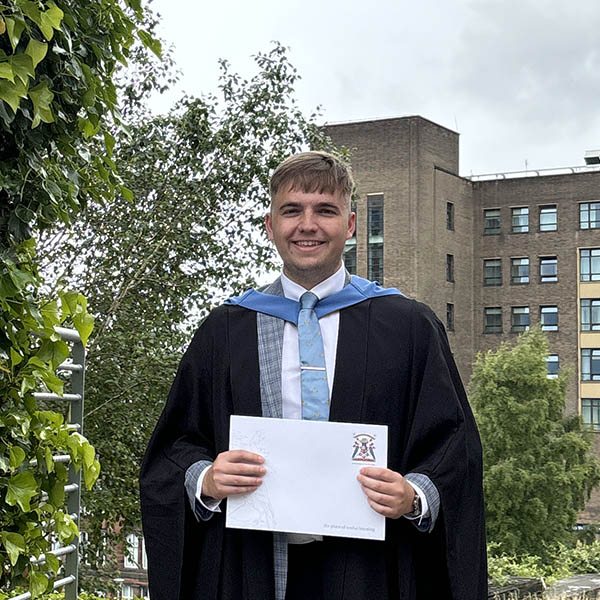BSc Hons Mathematics with Teaching
ApplyKey facts
- UCAS Code: G1XC
- Accreditation: Institute of Mathematics and its Applications & General Teaching Council for Scotland
Second year entry: available
Part-time study: available
Study with us
- combine an Institute of Mathematics and its Applications accredited course with the education theory and classroom experience required for recognition by the General Teaching Council for Scotland
- benefit from a professional teaching qualification which is recognised across the UK and overseas
- take part in secondary school placements
- qualify to enter the paid probationary year as a teacher of mathematics in Scottish secondary schools
- benefit from the flexibility to transfer between courses
The Place of Useful Learning
UK University of the Year
Daily Mail University of the Year Awards 2026
Scottish University of the Year
The Sunday Times' Good University Guide 2026
Why this course?
This joint Honours degree covers the curriculum of the BSc Honours Mathematics degree, plus the education theory and classroom experience required for recognition by the General Teaching Council for Scotland.
In four years, you’ll gain a joint Honours degree along with a professional teaching qualification and will be qualified to enter the probationary year as a teacher of mathematics in Scottish secondary schools.
Students on the BSc (Honours) in Mathematics course for the first two years can transfer to the Mathematics with Teaching course guaranteed (subject to progress requirements) for the start of 3rd year.


What you'll study
Years 1 & 2
You’ll follow the same curriculum as the BSc (Honours) in Mathematics; you study core mathematical methods and modules in calculus, geometry, applied analysis, mechanics, analysis, and probability and statistics.
Year 3
Will be devoted to studying a mixture of level 3 and level 4 Mathematics and Statistics modules.
Year 4
In this year you will take modules that develop the pedagogy of teaching.
Alongside these modules, a major part of Year 4 in the Strathclyde Institute of Education are school placements in Scottish secondary schools. There are 18 weeks of placement in total with one placement in each semester of the programme.
Placement one operates on a model of solo teaching, team teaching and observation of your colleagues within the science department in which you are based. This progression is designed to support you in developing your confidence at this early stage of your teaching journey.
The second placement is longer with greater expectations on you in terms of planning for greater periods of responsibility, becoming an active member in your science department and gaining the confidence to get involved in the wider life of the school. The aim here is to see you become a rounded practitioner ready for your own classroom.
Placement is your chance to put what you are learning into practice, and you will be encouraged to explore your own teaching style, learn new techniques and develop relationships with your pupils. You will be assessed during placements and school and University staff will assist your professional development in ways that should help you meet the ‘Standard for Provisional Registration’ set by the General Teaching Council for Scotland (GTCS). Successful completion of the course will see you enter a guaranteed probationary year in a Scottish local authority school where you will be supported further with mentoring and a reduced timetable in your first year.
Facilities
You’ll have access to well-equipped, modern computing laboratories and teaching rooms, as well as 24-hour access to an advanced computer information network and a sophisticated virtual e-learning environment. We have also an undergraduate common room which gives you a modern and flexible area that's used for individual and group study work and is also a relaxing social space.
Work placement
You'll spend parts of the course on placement in a school within Scotland, working throughout the full working day, attending school on staff in-service days and being continually assessed while there.
Accreditation
Accredited by the Institute of Mathematics and its Applications for the purpose of meeting in full the educational requirement for chartered status.
Accredited by the General Teaching Council for Scotland.
Study abroad
You will have the opportunity to spend time studying abroad, normally in the third year of the course. We have links with European and non-European universities, which include:
- University of Limerick, Republic of Ireland
- Johannes Kepler University, Linz, Austria
- Technical University of Denmark, Lyngby, Denmark
- University of Toronto, Canada
- Queen's University at Kingston, Canada
- George Institute of Technology, USA
- Swinburne University of Technology, Melbourne, Australia
- University of Otago, New Zealand
- Nanyang Technological University, Singapore
The Department of Mathematics & Statistics
At the heart of the Department of Mathematics & Statistics is the University’s aim of developing useful learning. Our research emphasises how mathematics and statistics can be applied in the real world and have societal impact. We're an applied department with many links to industry and government, bridging the gap between academia and real life. Many of the academic staff hold joint appointments with, or are funded by, other organisations, such as APHA, Public Health and Intelligence (Health Protection Scotland), NHS Greater Glasgow and Clyde, and the Marine Alliance for Science and Technology Scotland (MASTS).
Learning & teaching
The following teaching methods are used in Mathematics & Statistics: lectures (using a variety of media including electronic presentations and computer demonstrations), tutorials, coursework and projects.
You’ll also learn through structured group work in problem-solving and collaborative student presentations.
On completion of the programme, you’ll be able to:
- demonstrate knowledge in the main areas of mathematics and the initial teacher education
- show an understanding of the principal mathematical and educational theories and a critical understanding of one or more specialised areas
- demonstrate skills in calculation
- develop and evaluate logical arguments, presenting them and their conclusions clearly and accurately
- demonstrate problem-solving skills, for example, abstracting the essentials of problems, formulating them mathematically and finding appropriate solutions
- undertake a critical analysis of data and draw conclusions from the data
- demonstrate a range of general skills, including IT competency
Assessment
In mathematics & statistics, knowledge, understanding, and subject-specific skills are assessed by coursework, assignment, reports, presentations and written examinations.
The education element of the course includes practical time observing and teaching in school classrooms.
What our students think

Luke Campbell
The staff are brilliant to work alongside and the university is in a great location for socialising, transport links, coffee shops and more.

Carla Findlay
Looking back at my time at Strathclyde, I couldn't pick just one highlight. For me, meeting new people from all different backgrounds and making new friendships is definitely one of them. I now have friends for life and I couldn't imagine my life without them.

Holly Lafferty
I knew Strathclyde was the uni for me, as it had great social aspects as well as being a great uni for sciences. I am so glad I did choose Strathclyde because I’ve made friends for life and really enjoyed my course so far.

Jonathan Sneddon
I loved the flexibility of the combined degree course; it allowed me to get out on placement in my final year for 18 weeks and still get the full experience of the mathematics degree for my three years prior.

Eilidh Cuthbertson
Throughout both placements I feel like I have matured and developed as a teacher and I’m taking on all the advice I was given. I am now on my probation year and I’m loving it.
Compulsory modules
Mathematical Foundations (20 credits)
This covers the basic concepts and standard methods of mathematical notation and proof; functions; complex numbers and variables; solution of equations; resolution of inequalities; sequences and series.
Calculus 1 (20 credits)
This introduces the fundamental concepts of calculus, and develops some of their applications including basic ordinary differential equations.
Introduction to Geometry & Algebra (20 credits)
This gives an introductory treatment of vectors, matrices, geometry, and discrete maths and introduces their application to real-world problems.
Mathematics in Society (20 credits)
A course that presents the place of mathematics and statistics in society, both historical and contemporary, while introducing some essential study skills, allowing students to develop and practice personal and technical skills.
Essential Statistics (10 credits)
A presentation of some basic ideas and techniques of statistics. This module will also introduce students to the R statistical software.
Data Analysis & Presentation (10 credits)
A module that focuses on communicating mathematics and statistics that will facilitate practical development of communication skills in data analysis, report writing and making presentations.
Compulsory modules
Linear Algebra & Differential Equations (20 credits)
This module will introduce you to the basic ideas of linear algebra, such as matrices and determinants, vector spaces, bases, eigenvalues and eigenvectors. You'll study various standard methods for solving ordinary differential equations and understand their relevance.
Advanced Calculus (20 credits)
This module will present basic ideas, techniques and results for calculus of two and three variables, along with differentiation and integration over curves, surfaces and volumes of both scalar and vector fields.
Applicable Analysis 1 (20 credits)
This module will give a rigorous treatment of convergence of sequences and infinite series of real numbers and of continuity, differentiability and integrability of functions of a real variable. It will illustrate the importance of these concepts in the analysis of problems arising in applications.
Probability & Statistical Inference (20 credits)
This module will present the basic concepts of probability theory and statistical inference and provide you with the tools to appropriately analyse a given data set and effectively communicate the results of such analysis.
Applications of Mathematical Modelling (20 credits)
This module will develop your understanding and application of mathematical modelling techniques in a wide variety of contexts. This will include tools including vectors and ordinary differential equations, applied in a wide variety of contexts.
Mathematical & Statistical Computing (20 credits)
This module will introduce you to the R computing environment. It'll enable you to use R to import data and perform statistical tests, allow you to understand the concept of an algorithm and what makes a good algorithm and will equip you for implementing simple algorithms in R.
In third year you will study compulsory and optional modules totalling 120 credits.
Compulsory modules
Differential Equations (20 credits)
In this module we’ll introduce you to analytical methods for solving ordinary and partial differential equations, so you'll develop an understanding along with technical skills in this area.
Inference & Regression Modelling (20 credits)
This module will:
- review the concepts of probability distributions and how to work with these
- present approaches to parameter estimation, focusing on maximum likelihood estimation, bootstrap estimation, and properties of estimators
- present hypothesis testing procedures, including classical likelihood ratio tests and computer-based methods for testing parameter values, and goodness-of-fit tests
- introduce and provide understanding of the least squares multiple regression model, general linear model, transformations and variable selection procedures
- present use of R functions for regression and interpretation of R output
Optional modules
Linear Algebra (20 credits)
In this module we'll introduce basic algebraic structures, with particular emphasis on those pertaining to finite dimensional linear spaces and deepen your understanding of linear mappings. We'll also provide an introduction to inner product spaces and bilinear forms.
Mechanics of Rigid Bodies & Fluids (20 credits)
This module will:
- convey the generalisation of the mechanics of single-particle systems to many-particle systems
- convey the central ideas of a continuum description of material behaviour and to understand relevant constraints
- ground students in the basic principles governing three-dimensional motions of rigid bodies
- convey how the ideas of continuum theory are applied to static and inviscid fluids
Modelling & Simulation with Applications to Financial Derivatives (20 credits)
In this module you'll get an introduction to ideas in mathematics and statistics that can be used to model real systems, with an emphasis on the valuation of financial derivatives. This module places equal emphasis on deterministic analysis (calculus, differential equations) and stochastic analysis (Brownian motion, birth and death processes). In both cases, in addition to theoretical analysis, appropriate computational algorithms are introduced.
The first half of the module introduces general modelling and simulation tools, and the second half focuses on the specific application of valuing financial derivatives, including the celebrated Black-Scholes theory.
Applicable Analysis 3 (20 credits)
This module will present the main results in Functional Analysis. You will also be introduced to linear operators on Banach and Hilbert spaces and study applications to integral and differential equations.
Statistical Modelling & Analysis (20 credits)
You will be provided with a range of applied statistical techniques that can be used in professional life. This module provides you with the fundamental principles of statistical modelling through experimental design and multivariate analysis.
Fluids & Waves (20 credits)
In this module you'll be introduced to the theory of Newtonian fluids and its application to flow problems and the dynamics of waves on water and in other contexts.
Finite Element Methods for Boundary Value Problems & Approximation (20 credits)
In this module you'll be presented with the basic theory and practice of finite element methods and polynomial and piecewise polynomial approximation theory.
Applied Statistics in Society (20 credits)
In this module you'll be introduced to a range of modern statistical methods and practices used in industry, commerce and research, and you will develop skills in your application and presentation.
Mathematical Biology & Marine Population Modelling (20 credits)
In this module, you'll learn the application of mathematical models to a variety of problems in biology, medicine, and ecology. The module will show:
- the application of ordinary differential equations to simple biological and medical problems
- the use of mathematical modelling in biochemical reactions
- the application of partial differential equations in describing spatial processes such as cancer growth and pattern formation in embryonic development
- the use of delay-differential equations in physiological processes.
The marine population modelling element will introduce the use of difference models to represent population processes through applications to fisheries, and the use of coupled ODE system to represent ecosystems. Practical work will include example class case studies that will explore a real-world application of an ecosystem model.
Mathematical Introduction to Networks (20 credits)
This module will demonstrate the central role network theory plays in mathematical modelling. It'll also show the intimate connection between linear algebra and graph theory and how to use this connection to develop a sound theoretical understanding of network theory. Finally, it'll apply this theory as a tool for revealing structure in networks.
Medical Statistics (20 credits)
This module will cover the application of classical statistical methods to data collected for health care research. There will be an emphasis on the use of real data and the interpretation of statistical analyses in the context of the research hypothesis under investigation. Topics covered will include:
- survival analysis
- experimental design and sampling
- categorical data analysis
- clinical measurement
Compulsory modules
Education Studies: Professional Values (20 credits)
In this module, you'll explore the theoretical underpinnings of education. You'll be encouraged to engage with issues of the nature and the purpose of education, social justice and equality, and practice and policy in relation to ethical and political ideas. Throughout this module, we aim to disrupt and expand your thinking about education. You'll be asked to reflect on your values and beliefs in relation to a range of educational questions and issues and you will be presented with questions designed to challenge and refine your current thinking.
The module will give you opportunities to consider how theoretical underpinnings relate to the classroom; how your developing understanding translates into the education context; and how your own values and beliefs interact with your developing professional identity. Human Rights and Learning for Sustainability together form the basic architecture of this module.
Professional Learning Through Enquiry (20 credits)
This module aims to develop students as enquiring self-reflective practitioners who are able to work collaboratively to develop skills, knowledge and expertise in an area of professional practice. Students will be supported to develop as autonomous, transformative leaders of change. Across the globe there is a growing call for education systems to be responsive to the increasingly dynamic, complex and fast-changing nature of society. Through this module, students will develop the skills and expertise necessary to respond to the changing circumstances of the learning communities they encounter.
Professional Skills (80 credits)
Curriculum & Pedagogy (40 credits)
The module will provide active and collaborative opportunities for you to explore how to plan discrete, integrated, and interdisciplinary curricular learning with a particular focus on the teaching of chemistry and general science.
Professional Practice (40 credits)
Taught both on campus and in schools, this module will enable you to become an effective teacher through learning pedagogical theory, observing experienced teachers and applying your knowledge and understanding in the practical context.
Chat to a student ambassador
Want to know more about what it’s like to be a Science student at the University of Strathclyde? A selection of our current students are here to help!
Our Unibuddy ambassadors can answer all your questions about courses and studying at Strathclyde and offer insight into their experiences of life in Glasgow and Scotland.
Entry requirements
Required subjects are shown in brackets.
| Highers |
Year 1 entry: AABB/ABBBC (Maths A, English C, Advanced Higher Maths recommended) BBBB (including Maths at B, English at C and 70% in Strathclyde Summer School Mathematics) or ABBB (Maths A, English C) |
|---|---|
| Advanced Highers | Year 2 entry: AB (Maths A, Higher English C) |
| A Levels | Standard entry requirements*: Year 1 entry: BBB (Maths B, GCSE English Language 4/C and Literature 4/C) Year 2 entry: ABB (Maths A, GCSE English Language 4/C and Literature 4/C) |
| International Baccalaureate | Standard entry requirements*: Year 1 entry: 30 (Mathematics HL5, English SL6) (Mathematics HL6, English SL6) |
| HNC/HND | Year 1 entry: relevant HNC with strong mathematical content, B in Graded Unit, plus Higher Maths at A or 70% in Strathclyde Summer School Mathematics |
| HNC | Year 1 entry: relevant HNC with strong mathematical content, B in Graded Unit |
| International students | International students should apply to our BSc Hons Mathematics with Teaching (International). |
| Deferred entry | Accepted |
Additional information
Students are required to register with the Scottish Government’s Protecting Vulnerable Groups scheme (PVG) before they start year 4 of the programme.
Please note that applicants who are made an offer of study will be required to attend and pass an interview.
*Standard entry requirements
Offers are made in accordance with specified entry requirements although admission to undergraduate programmes is considered on a competitive basis and entry requirements stated are normally the minimum level required for entry.
Whilst offers are made primarily on the basis of an applicant meeting or exceeding the stated entry criteria, admission to the University is granted on the basis of merit, and the potential to succeed. As such, a range of information is considered in determining suitability.
In exceptional cases, where an applicant does not meet the competitive entry standard, evidence may be sought in the personal statement or reference to account for performance which was affected by exceptional circumstances, and which in the view of the judgement of the selector would give confidence that the applicant is capable of completing the programme of study successfully.
**Minimum entry requirements
Why Eva chose Maths with Teaching
In the video below, Eva tells us why she chose to study Maths with Teaching and what she hopes to do after she graduates:
Contextual Admissions for Widening Access
We want to increase opportunities for people from every background.
Strathclyde selects our students based on merit, potential, and the ability to benefit from the education we offer. We look for more than just your grades. We consider the circumstances of your education and will make lower offers to certain applicants as a result.
University preparation programme for international students
We offer international students (non-UK/Ireland) who do not meet the academic entry requirements for an undergraduate degree at Strathclyde the option of completing an Undergraduate Foundation Programme in Business and Social Sciences at the University of Strathclyde International Study Centre.
Upon successful completion, you can progress to your chosen degree at the University of Strathclyde.
International students
We've a thriving international community with students coming here to study from over 140 countries across the world. Find out all you need to know about studying in Glasgow at Strathclyde and hear from students about their experiences.

Fees & funding
All fees quoted are for full-time courses and per academic year unless stated otherwise.
Fees may be subject to updates to maintain accuracy. Tuition fees will be notified in your offer letter.
All fees are in £ sterling, unless otherwise stated, and may be subject to revision.
Annual revision of fees
Students on programmes of study of more than one year (or studying standalone modules) should be aware that the majority of fees will increase annually.
The University will take a range of factors into account, including, but not limited to, UK inflation, changes in delivery costs and changes in Scottish and/or UK Government funding. Changes in fees will be published on the University website in October each year for the following year of study and any annual increase will be capped at a maximum of 10% per year. This cap will apply to fees from 2026/27 onwards, which will not increase by more than 10% from the previous year for continuing students.
| Scotland | To be confirmed. Fees for students domiciled in Scotland are subject to confirmation by the Scottish Funding Council. Scottish undergraduate students undertaking an exchange for a semester/year will continue to pay their normal tuition fees at Strathclyde and will not be charged fees by the overseas institution. |
|---|---|
| England, Wales & Northern Ireland | £9,790 Fees for students domiciled in the Rest of the UK are subject to Parliamentary approval. |
| Republic of Ireland |
If you are an Irish citizen and have been ordinary resident in the Republic of Ireland for the three years prior to the relevant date, and will be coming to Scotland for Educational purposes only, you will meet the criteria of England, Wales & Northern Ireland fee status. For more information and advice on tuition fee status, you can visit the UKCISA - International student advice and guidance - Scotland: fee status webpage. Find out more about the University of Strathclyde's fee assessments process. |
| International | £22,750 |
| University preparation programme fees | International students can find out more about the costs and payments of studying a university preparation programme at the University of Strathclyde International Study Centre. |
| Additional costs | Course materials & costsClass materials (lecture notes and exercise sheets) for the majority of Mathematics & Statistics classes are available free to download. For some classes, students may need access to a textbook. Textbook costs are typically in the £20 to £60 price range. These prices are dependent on format (e-book, soft or hardback) and whether bought new or second hand. PlacementsTravel to placement schools: costs vary depending on distance to school. Students using their own transport may incur additional insurance costs. PVG scheme (Protection of Vulnerable Groups)Fourth-year Mathematics with Teaching students will need to pay for the full price of a PVG membership scheme. International studentsInternational students may have associated visa and immigration costs. Please see student visa guidance for more information. |
| Available scholarships | Take a look at our scholarships search for funding opportunities. |
Please note: All fees shown are annual and may be subject to an increase each year. Find out more about fees.
How can I fund my studies?
Students from Scotland
Fees for students who meet the relevant residence requirements in Scotland, you may be able to apply to the Student Award Agency Scotland (SAAS) to have your tuition fees paid by the Scottish government. Scottish students may also be eligible for a bursary and loan to help cover living costs while at University.
For more information on funding your studies have a look at our University Funding page.
Students from England, Wales & Northern Ireland
We have a generous package of bursaries on offer for students from England, Northern Ireland and Wales:
You don’t need to make a separate application for these. When your place is confirmed at Strathclyde, we’ll assess your eligibility. Take a look at our scholarships search for funding opportunities.
International Students
We have a number of scholarships available to international students. Take a look at our scholarship search to find out more.
Glasgow is Scotland's biggest & most cosmopolitan city
Our campus is based right in the very heart of Glasgow. We're in the city centre, next to the Merchant City, both of which are great locations for sightseeing, shopping and socialising alongside your studies.
Careers
Students from Scotland, other parts of the UK and the Republic of Ireland, who are studying at a Scottish Higher Education Institution are eligible to join the Teacher Induction Scheme (TIS). This provides a guaranteed 1-year training post in a local authority to every eligible student graduating with a teaching qualification from one of Scotland’s Higher Education Institutions. Find out more about the Teacher Induction Scheme.
How much will I earn?
From 1 January 2024, the starting annual salary for a probationer teacher in Scotland is £32,217. After your probationary year, your salary will increase to £38,655 and then increment each year up to £48,516. A principal teacher can earn from £52,896 to £68,265 while a headteacher can earn from £59,994 to £110,808.
If you teach in a remote school or on certain islands you may receive an additional allowance.
Visit Teach Scotland website for more information.
Apply
International students should apply to our BSc Hons Mathematics with Teaching (International).
Start date:
Mathematics with Teaching (1 year entry)
Start date:
Mathematics with Teaching (2 year entry)
Contact us
Have you considered?
We've a range of Mathematics courses similar to this one which may also be of interest.

